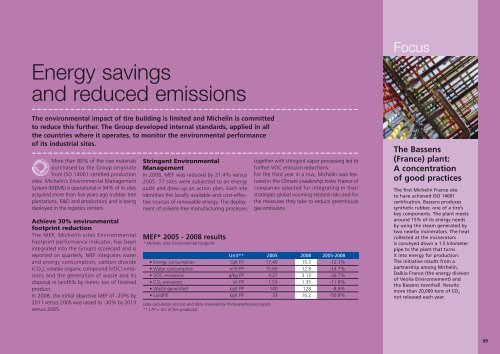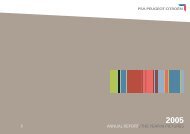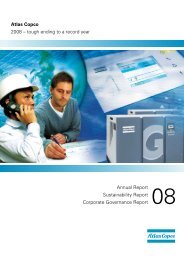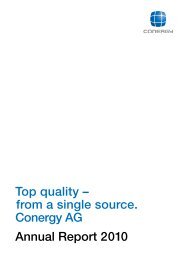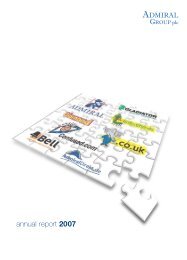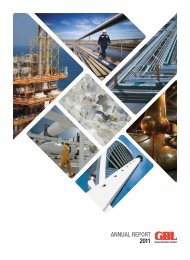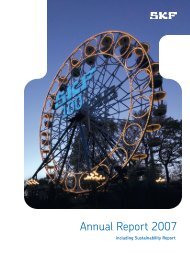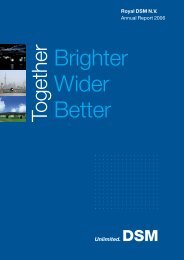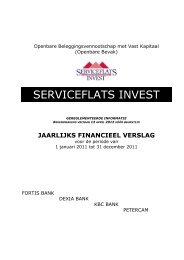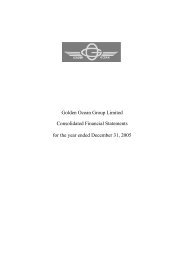MICHELIN - 2008 ANNUAL REPORT
MICHELIN - 2008 ANNUAL REPORT
MICHELIN - 2008 ANNUAL REPORT
You also want an ePaper? Increase the reach of your titles
YUMPU automatically turns print PDFs into web optimized ePapers that Google loves.
Energy savings<br />
and reduced emissions<br />
The environmental impact of tire building is limited and Michelin is committed<br />
to reduce this further. The Group developed internal standards, applied in all<br />
the countries where it operates, to monitor the environmental performance<br />
of its industrial sites.<br />
More than 80% of the raw materials<br />
purchased by the Group originate<br />
from ISO 14001 certified production<br />
sites. Michelin’s Environmental Management<br />
System (MEMS) is operational in 94% of its sites<br />
acquired more than five years ago (rubber tree<br />
plantations, R&D and production) and is being<br />
deployed in the logistics centers.<br />
Achieve 30% environmental<br />
footprint reduction<br />
The MEF, Michelin sites Environmental<br />
Footprint performance indicator, has been<br />
integrated into the Group’s scorecard and is<br />
reported on quarterly. MEF integrates water<br />
and energy consumption, carbon dioxide<br />
(CO 2 ), volatile organic compound (VOC) emissions<br />
and the generation of waste and its<br />
disposal in landfills by metric ton of finished<br />
product.<br />
In <strong>2008</strong>, the initial objective MEF of -20% by<br />
2011 versus 2005 was raised to -30% by 2013<br />
versus 2005.<br />
Stringent Environmental<br />
Management<br />
In <strong>2008</strong>, MEF was reduced by 21.4% versus<br />
2005. 77 sites were subjected to an energy<br />
audit and drew up an action plan. Each site<br />
identifies the locally available and cost-effective<br />
sources of renewable energy. The deployment<br />
of solvent-free manufacturing processes<br />
MEF* 2005 - <strong>2008</strong> results<br />
* Michelin sites Environmental Footprint.<br />
together with stringent vapor processing led to<br />
further VOC emission reductions.<br />
For the third year in a row, Michelin was featured<br />
in the Climate Leadership Index France of<br />
companies selected for integrating in their<br />
strategies global warming-related risks and for<br />
the measures they take to reduce greenhouse<br />
gas emissions.<br />
Unit** 2005 <strong>2008</strong> 2005-<strong>2008</strong><br />
• Energy consumption Gj/t PP 17.40 15.3 -12.1%<br />
• Water consumption m 3 /t PP 15.00 12.8 -14.7%<br />
• VOC emissions g/kg PP 4.27 3.13 -26.7%<br />
• CO 2 emissions t/t PP 1.53 1.35 -11.8%<br />
• Waste generated kg/t PP 140 128 -8.9%<br />
• Landfill kg/t PP 33 16.2 -50.9%<br />
Data calculation process and data reviewed by PricewaterhouseCoopers.<br />
** t PP = ton of tire produced.<br />
Focus<br />
The Bassens<br />
(France) plant:<br />
A concentration<br />
of good practices<br />
The first Michelin France site<br />
to have achieved ISO 14001<br />
certification, Bassens produces<br />
synthetic rubber, one of a tire’s<br />
key components. The plant meets<br />
around 15% of its energy needs<br />
by using the steam generated by<br />
two nearby incinerators. The heat<br />
collected at the incinerators<br />
is conveyed down a 1.5 kilometer<br />
pipe to the plant that turns<br />
it into energy for production.<br />
The initiative results from a<br />
partnership among Michelin,<br />
Dalkia France (the energy division<br />
of Veolia Environnement) and<br />
the Bassens townhall. Results:<br />
more than 20,000 tons of CO 2<br />
not released each year.<br />
09


